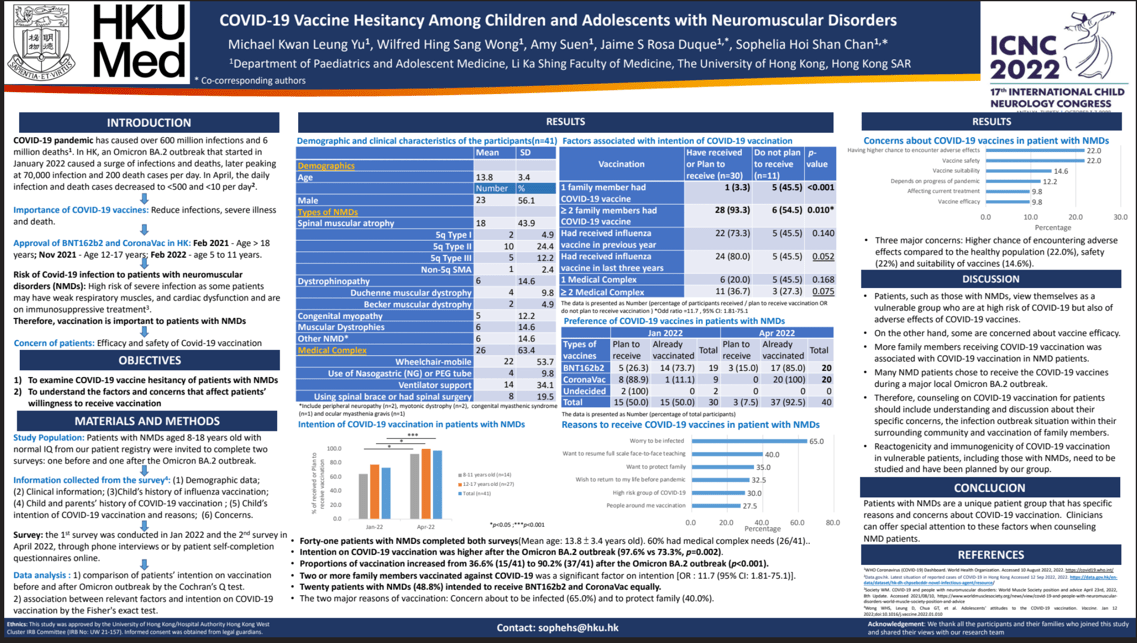COVID-19 Vaccine Hesitancy Among Neuromuscular Disorder Children and Adolescents
Michael Kwan Leung Yu, Wilfred Hing Sang Wong, Amy Suen, Jaime S Rosa Duque, Sophelia Hoi Shan Chan
Objectives: The COVID-19 pandemic has caused millions of infections and deaths. As the risk of severe COVID-19 may be high in neuromuscular disorders (NMDs), vaccination is vital for protection of NMDs patients. The aim of this study is to examine the vaccine hesitancy among children and adolescents with NMDs.
Methods: Forty-five NMD patients (8-18 years old) completed an online questionnaire/ phone interview in Jan 2022 inquiring their willingness, choice and views of COVID-19 vaccination. The questionnaire included 23 yes/no or multiple-choice questions collecting information on demographic and clinical data, history of COVID-19 infection, previous influenza and COVID-19 vaccination, their intention on COVID-19 vaccination (if they have not received yet) and the reasons for their choices.
Results: We found 73.3% NMD patients (n=33) were willing to receive either of our available COVID-19 vaccines (BNT162b2 or CoronaVac), with half (n=17) of whom have already been vaccinated. The major reasons for COVID-19 vaccination willingness included their hope to return to normal life, return to face-to-face teaching and join study trips. A quarter of NMDs respondents who intended to vaccinate perceived COVID-19 infection as high risk to them. Major concerns against vaccination included safety and lack of efficacy. Two or more vaccinated family members was an important factor for willingness to vaccinate (odds ratio=15.5, p=0.003).
Conclusion: Our study found that a quarter of NMD patients still had COVID-19 vaccine hesitancy. Familial influence was significant, and therefore education to both parents and patients will likely improve the vaccination rate in paediatric NMD patients.
Keywords: COVID-19; vaccine hesitancy; Neuromuscular disorder; Children and Adolescents
Michael Kwan Leung Yu
The University of Hong Kong
Hong Kong
Wilfred Hing Sang Wong
The University of Hong Kong
Hong Kong
Amy Suen
The University of Hong Kong
Hong Kong
Jaime S Rosa Duque
The University of Hong Kong
Hong Kong
Sophelia Hoi Shan Chan
The University of Hong Kong
Hong Kong
Objectives: The COVID-19 pandemic has caused millions of infections and deaths. As the risk of severe COVID-19 may be high in neuromuscular disorders (NMDs), vaccination is vital for protection of NMDs patients. The aim of this study is to examine the vaccine hesitancy among children and adolescents with NMDs.
Methods: Forty-five NMD patients (8-18 years old) completed an online questionnaire/ phone interview in Jan 2022 inquiring their willingness, choice and views of COVID-19 vaccination. The questionnaire included 23 yes/no or multiple-choice questions collecting information on demographic and clinical data, history of COVID-19 infection, previous influenza and COVID-19 vaccination, their intention on COVID-19 vaccination (if they have not received yet) and the reasons for their choices.
Results: We found 73.3% NMD patients (n=33) were willing to receive either of our available COVID-19 vaccines (BNT162b2 or CoronaVac), with half (n=17) of whom have already been vaccinated. The major reasons for COVID-19 vaccination willingness included their hope to return to normal life, return to face-to-face teaching and join study trips. A quarter of NMDs respondents who intended to vaccinate perceived COVID-19 infection as high risk to them. Major concerns against vaccination included safety and lack of efficacy. Two or more vaccinated family members was an important factor for willingness to vaccinate (odds ratio=15.5, p=0.003).
Conclusion: Our study found that a quarter of NMD patients still had COVID-19 vaccine hesitancy. Familial influence was significant, and therefore education to both parents and patients will likely improve the vaccination rate in paediatric NMD patients.
Keywords: COVID-19; vaccine hesitancy; Neuromuscular disorder; Children and Adolescents
Michael Kwan Leung Yu
The University of Hong Kong
Hong Kong
Wilfred Hing Sang Wong
The University of Hong Kong
Hong Kong
Amy Suen
The University of Hong Kong
Hong Kong
Jaime S Rosa Duque
The University of Hong Kong
Hong Kong
Sophelia Hoi Shan Chan
The University of Hong Kong
Hong Kong

Michael Kwan Leung Yu
The University of Hong Kong Hong Kong
The University of Hong Kong Hong Kong